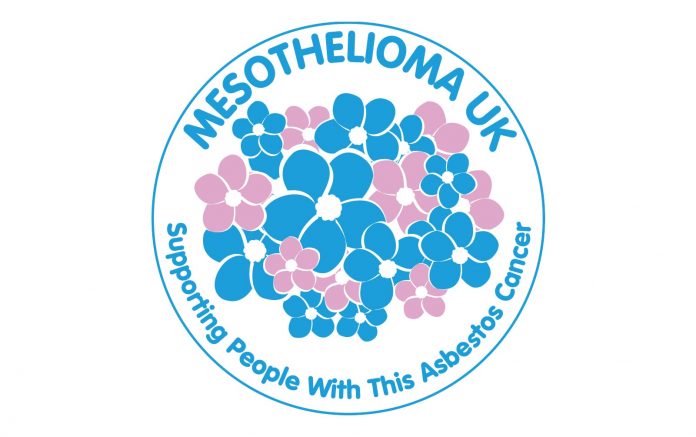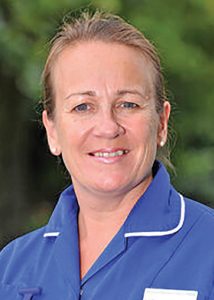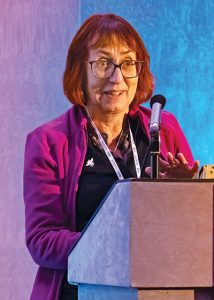By Liz Darlison, MBE, EN, RN, BSc, MSc; Clare Gardiner, PhD, BSc (hons); Catherine Henshall, MN, RN, MA, PhD; and Angela M. Tod, PhD, MSc, MMedSci, BA (hons), RN
Posted: June 9, 2020
The United Kingdom has the highest incidence of mesothelioma in the world. More than 2,700 people in the United Kingdom are diagnosed each year.1 Despite epidemiologists predicting that the peak would be reached approximately 5 to 10 years ago,2,3 the incidence continues to rise.
Mesothelioma UK is a national charity dedicated to the disease. It was established almost 16 years ago, initially as a Macmillan Cancer Support specialist service. Its aim is to meet national support and information needs and to further develop national specialist mesothelioma support. Mesothelioma UK was registered as an independent charity in 2009.
Mesothelioma UK funds audit and research, and over the last 4 years this has translated into spending of almost £1 million (U.S. $1.2 million). The charity is the sole funder of the National Mesothelioma Audit and has released research funds through a number of partner organizations.4 Mesothelioma UK will soon launch its first-ever research strategy. This outlines a structured and more independent approach to meeting the charity’s aim to eventually spend one-third of annual income on audit and research.
Another major focus for the charity is equitable access to the best treatment, care, and support available, with a particular emphasis on clinical trials. Mesothelioma UK also provides support and information for anything related to mesothelioma, from signs and symptoms to benefits, compensation, support groups, end of life care, and more. This provision is enhanced and probably dependent on the charity’s growing team of mesothelioma clinical nurse specialists (CNSs).
Despite a “cash-strapped” healthcare system and a shortage of registered nurses, the United Kingdom has a growing body of cancer CNSs. In England alone, between 2014 and 2017, the number of CNS whole-time equivalents increased by 30%, from 3,088 to 4,020.5 This number includes 629 breast, 451 colorectal, and 372 lung CNSs. Within their specialist tumor site, each CNS acts as a key worker; these individuals treat and manage the health concerns of patients and work to promote health and well-being in the patients they care for. They use their skills and expertise in cancer care to provide physical and emotional support, coordinate care services, and inform and advise patients on clinical as well as practical issues.6 In addition, there is evidence showing how CNSs can reduce treatment costs, increase efficiency, drive innovation, provide valuable information for service redesign, and enable multidisciplinary care and communication between different teams.6
Mesothelioma UK is committed to ensuring that those diagnosed with mesothelioma have support opportunities equal to that of all patients with cancer, through National Health Service (NHS) access to a nurse specialist who is an expert in all aspects of mesothelioma. Currently, the charity provides funding for 25 mesothelioma CNSs based in NHS hospitals across the United Kingdom, from Inverness, Scotland to Plymouth, England.
Creating a national expert team of specialist nurses has enabled nationwide insight and experience to be generated and collated regarding mesothelioma. This knowledge and understanding are both new and valuable, and they have created an environment conducive to readily identifying gaps in evidence and areas of patient and caregiver need, worthy of rigorous inquiry. Linking with academic colleagues and institutions, the following studies have been developed with and fully supported by the Mesothelioma UK CNS team. Funding has been secured through Mesothelioma UK grants and collaborations. Some of the studies have been completed and reported. Others are ongoing, and a brief update of progress is provided.
Study 1: Mesothelioma and Radical Surgery: Patient Experience Arm of a Feasibility Trial
Grant awarded by John Pickering Charitable Trust, with support from Mesothelioma UK, August 2016.
Methods
Longitudinal, qualitative, nested study within a feasibility trial.
Summary of findings
The Mesothelioma and Radical Surgery Trial (MARS 2)7,8 aimed to evaluate the benefits of surgery by comparing chemotherapy and surgery against chemotherapy alone. The MARS 2 pilot evaluated the viability of recruitment. This longitudinal, qualitative study approach was nested within the MARS 2 pilot. Semi-structured telephone interviews were conducted with 15 trial participants. Interviews were conducted post-randomization, post-surgery (surgery arm), and at 6 and 12 months. Forty-one interviews were carried out. Data were analyzed using framework techniques.
Challenges were identified regarding volume and complexity of information, maintaining equipoise, and patient understanding of randomization. Factors influencing participation included access to surgery, self-assessment of ability to cope with trial treatments, capacity to maintain a positive approach, and altruism. Obstacles included the logistics of traveling for treatment in an unfamiliar setting. Negative consequences of trial participation included increased uncertainty amplified by multiple care providers and unclear transition arrangements post-trial.
Study 2: Receiving a Diagnosis of Mesothelioma: Improving the Patient Experience
Grant awarded by Mesothelioma UK, August 2016.
Methods
This qualitative study comprised 31 individual interviews with patients, family caregivers, and health professionals. This was followed by two group interviews of 42 people each and an electronic consultation exercise with 39 patients.
Summary of findings
Receiving A Diagnosis of Mesothelioma (RADIO Meso)7,9 aimed to understand the experience of communicating a diagnosis of malignant pleural mesothelioma (MPM) from the perspective of patients, family caregivers, and health professionals.
Key findings include the importance of providing the diagnosis as an ongoing process and the need to provide continuity and consistency. The CNS and effective multidisciplinary team provided vital contributions to successful communication of the mesothelioma diagnosis. Facilitators to diagnosis communication included honesty and timeliness, partnership working, and maintaining a patient-centered approach. Challenges to included accessing ongoing training, ensuring a suitable clinical environment, and being able to allocate appropriate time. These findings provide the basis for a set of recommendations that can be used by health professionals to improve the MPM diagnosis experience.
Study 3: Military Mesothelioma Experience Study: Understanding the Impact of Mesothelioma for Military Personnel and Veterans
Grant awarded by Mesothelioma UK, December 2017.
Study summary
This research is part of a larger project run by Mesothelioma UK that aims to improve the service and care provision to individuals with mesothelioma who have served in the armed forces as well as to raise awareness and therefore prevent exposure for those currently in the armed forces.
There is currently no evidence reporting the incidence of mesothelioma among UK military personnel and veterans, although it is suspected that this group may encounter particular challenges, including securing timely diagnosis, accessing care and support, and obtaining financial help. Military Mesothelioma Experience Study (MiMES) aims to address the above evidence gap across two workstreams. Workstream 1 focuses on the epidemiology and aims to increase the understanding of the incidence and prevalence of mesothelioma among British armed forces personnel and veterans. Workstream 2 explores the experiences of British armed forces personnel and veterans with mesothelioma and their family members. This research will engage with health professionals and support agencies to identify how services can best meet the health and support needs of these patients and their families.
Brief update
Data collection is now complete in MiMES. We have interviewed 14 veterans living with mesothelioma, 10 family members, and eight health, legal, and asbestos support group professionals. Analysis is ongoing, and findings are being tested among stakeholders. We are developing some “pen portraits” from the study. These are educational materials for health professionals and other support staff that will help inform the provision of services to individuals with an armed forces background who have been diagnosed with mesothelioma. The expected date of completion is June 2020.
Study 4: MiMES PhD Studentship
Grant awarded by Mesothelioma UK, December 2017.
Study summary
As part of the MiMES project, Mesothelioma UK has funded a PhD student. The student has completed her confirmation review. She has also completed a literature review, exploring the existing research about the psychological effects of mesothelioma on patients and caregivers. This review highlighted gaps in the literature, including the fact that no one has studied the unique experience of caregivers or of people exposed to asbestos in particular workplaces. The student is therefore proposing a qualitative study to explore the psychological effects of mesothelioma in the UK military context, from caregivers’ perspectives.
Brief update
Once ethics clearance has been obtained, approximately 10 participants are expected to be interviewed, beginning in the spring of 2020. Expected date of completion is summer 2022.
Study 5: Mesothelioma Patients’ Experiences of Follow-Up Across Three NHS Trusts
Grant awarded by Mesothelioma UK, April 2018.
Study summary
A qualitative study using documentary analysis, interviews, and consultation meetings with stakeholders. Data collection and analysis are complete. The recommendations developed suggest that all patients with mesothelioma have access to a specialist mesothelioma team within a streamlined mesothelioma care pathway and that patients are equipped with the necessary information to guide their decision making with regard to standard treatment pathways.
Brief update
The findings are being written up for publication in a peer-reviewed academic journal. In addition, we are working with Mesothelioma UK to disseminate our recommendations with the aim of using these to influence policy and practice to improve the quality of care received by patients with mesothelioma.
Study 6: Exploring Clinical Decision Making in Mesothelioma Treatment Pathways Across Three NHS Trusts: A Mixed-Methods Study
Grant awarded by Mesothelioma UK, April 2019.
Study summary
A mixed-methods study using database analysis, interviews, and consultation meetings with stakeholders.
Brief update
NHS Health Research Authority approvals for this study have been obtained. Data collection was expected to commence in March 2020, but the study is now on hold due to COVID-19 restrictions.
Study 7: Living Well With Malignant Pleural Mesothelioma: Improving the Patient and Family Caregiver Experience: A Qualitative Study
Study summary
How to “live well” with long-term conditions such as cancer is a priority of the UK government; however, little research exists to help us understand what “living well” means to individuals with MPM and their family members and caregivers. This study seeks to identify core themes and recommendations for living well in this patient group and to identify recommendations to help them achieve meaningful and fulfilling lives.
This qualitative study will consist of two stages and will utilize framework analysis techniques.
- Stage 1: Individual interviews with up to 10 patients who received a diagnosis at least 6 months ago and with a prognosis of at least 3 months, and up to 10 family caregivers will be conducted to explore and understand the elements that constitute living well with MPM.
- Stage 2: We will assemble two focus groups to verify and expand on the findings.
Brief update
Individual interviews are completed and transcribed, and analysis of transcription is currently being conducted. Expected date of completion is August 2020.
Study 8: Gendered Experience of Mesothelioma Study
Grant awarded by Mesothelioma UK, May 2019.
Study summary
Following consultation with health and legal professionals, there was a suggestion that the experience of men and women with mesothelioma may vary. Initial indications suggest that awareness of the disease, experience of receiving a diagnosis, and access to treatment, compensation, and welfare may differ between men and women. The Gendered Experience of Mesothelioma Study (GEMS) aims to explore the experiences of men and women with mesothelioma, their family caregivers, and the various staff they meet. We will seek to understand the reason for any differences that are identified. Our goal is to establish with participants how services should best be delivered to be accessible and acceptable to both men and women.
The project will be conducted in four stages.
- Stage 1: Conduct secondary analysis of routine national data to provide information on sex and gender differences in the prevalence, incidence, mortality, and stage of diagnosis of mesothelioma. We also aim to describe gender differences in the access and uptake of treatment, health, and legal services.
- Stage 2: Reanalyze existing interviews of people with mesothelioma to gain an initial understanding of any differences in experience by gender.
- Stage 3: Conduct new interviews with people who have a diagnosis of mesothelioma and their family caregivers. We will also interview the range of staff involved in health, legal, and other mesothelioma support services.
- Stage 4: Consult with patients, family caregivers, and staff to develop recommendations regarding service delivery.
Secondary analysis is being conducted using a client database. In April 2020, we were given access to the Mesothelioma Outcomes, Research and Experience (MORE) survey data. Analysis of these data has commenced. Secondary analysis of existing interviews will be conducted to generate insights and a topic guide for future interviews.
Brief update
Secondary analysis of data from an asbestos support group has been conducted to examine similarities and differences by gender. We have conducted 24 interviews with people who have a diagnosis of mesothelioma (11 women and 13 men). Consultations on the findings are currently being conducted with mesothelioma nurse specialists, asbestos support group forums, solicitors, and patient groups. Expected date of completion is August 2020.
Study 9: Mesothelioma and Asbestos Guidelines Study
Grant awarded by Mesothelioma UK, August 2019.
Study summary
The Mesothelioma and Asbestos Guidelines Study (MAGS) aims to explore the experiences of presentation, diagnosis, treatment, and care for healthcare workers with mesothelioma. The study will develop a critical account of that experience, which will aid in the development of recommendations to increase awareness about the dangers of asbestos among healthcare workers.
Malignant mesothelioma (MM) is an aggressive, rare cancer caused by exposure to and inhalation of asbestos. Incidence is higher in certain occupational groups. Healthcare is not considered a high-risk industry for MM. Its employees do not fit the typical picture of MM and asbestos exposure. Despite this, many healthcare workers work in old buildings in which asbestos is likely to be present. This is similar to teachers exposed in old school buildings and prefabricated school accommodations. There is a concern that cases of MM due to such exposure could increase over time. Raised awareness and action taken by individual healthcare workers and employers could help avoid this.
This project is part of a larger program of research that aims to increase understanding of the mesothelioma experience from the perspective of patients, family caregivers, and the various professionals involved in their support and care. The study is in three phases:
- A rapid review of published and unpublished research examining the experience of healthcare workers who have developed mesothelioma.
- Stakeholder consultation to inform the empirical study.
- Interviews with healthcare workers who have developed mesothelioma.
Brief update
A rapid review of published and unpublished research examining the experience of healthcare workers who have developed mesothelioma is complete. Stakeholder consultation to inform the empirical study has also been completed, and stakeholders have been kept informed of the study. A Freedom of Information request has been submitted to identify how many cases have been submitted against the NHS for mesothelioma-related compensation. This is partially complete and reveals higher levels of mesothelioma in the population of healthcare workers than shown by the Office for National Statistics mesothelioma mortality figures. The data have not been broken down by occupation, as there is a cost attached to doing this. We are awaiting a reply about whether funding is available to do this.
So far, we have interviewed five healthcare workers with mesothelioma: three nurses, one general practitioner in primary care, and one healthcare assistant. In addition, we undertook two interviews with partners of healthcare workers (one healthcare administrator and one general practitioner). Analysis is ongoing. The project has been extended slightly at no cost, to allow for further recruitment. Expected date of completion is May 2020.
Study 10: Understanding the Role of Mesothelioma UK CNSs in Meeting the Palliative Care Needs of Patients and Families: A Mixed-Methods StudyGrant awarded by Mesothelioma UK, November 2019.
Study summary
The aim of this study is to explore the palliative care needs of patients with mesothelioma and to assess the diverse ways in which Mesothelioma UK CNSs are helping support and empower patients with palliative care needs and their families. We will use a mixed-methods research design, including scoping existing peer-reviewed evidence and analyzing data from the National Mesothelioma Experience Survey and the more recent MORE survey. We will also undertake qualitative focus groups with Mesothelioma UK CNSs to explore their role in the provision of palliative care, and to gain a more in-depth understanding of the varied ways they support and empower patients and their families. We hope this research will contribute to better understanding of the care and support individuals diagnosed with mesothelioma need toward the end of life, and will establish the important role of Mesothelioma UK CNSs in meeting these needs.
Brief update
An experienced research associate has recently been appointed to manage the study and will begin her role in April 2020. The study will be based within the mesothelioma research group at the Division of Nursing and Midwifery at the University of Sheffield and will work closely with Mesothelioma UK. Expected date of completion is June 2021.
In Summary
In just a few years, the collaboration between an expert team of nurses, a charity committed to patients, the NHS, and successful health academics has resulted in an excellent, clinically relevant portfolio of research. The collaboration supports the identification of relevant studies, the securing of research grants, and the dissemination of findings. Tools and resources have been developed on the basis of findings from the research, ensuring timely and maximum impact.
The collaborations described have emerged organically, but we hope that future work and activity will be further augmented following the publication of Mesothelioma UK’s research strategy and the establishment of the charity’s Centre for Research.
This approach is replicable in other countries. The hub-and-spoke national approach to specialist nursing, appropriate funds or grants, and a close working relationship with committed health academics are all equally essential. Opportunities to forge global partnerships would be welcome.
References:
1. Cancer Research UK. Mesothelioma statistics. Accessed March 5, 2020. https://www.cancerresearchuk.org/health-professional/cancer-statistics/statistics-by-cancer-type/mesothelioma.
2. Peto J, Matthews FE, Hodgson JT, Jones JR. Continuing increase in mesothelioma mortality in Britain. Lancet. 1995;345(8949):535-539.
3. Hodgson JT, McElvenny DM, Darnton AJ, Price MJ, Pete J. The expected burden of mesothelioma mortality in Great Britain from 2002-2050. Br J Cancer. 2005;92(3):587-593.
4. Royal College of Physicians. National Mesothelioma Audit. Accessed April 5, 2020. https://www.rcplondon.ac.uk/projects/national-mesothelioma-audit.
5. Macmillan Cancer Support. Cancer workforce in England: a census of cancer, palliative and chemotherapy speciality nurses and support workers in England in 2017. Accessed March 5, 2020. https://www.macmillan.org.uk/_images/cancer-workforce-in-england-census-of-cancer-palliative-and-chemotheraphy-speciality-nurses-and-support-workers-2017_tcm9-325727.pdf.
6. Macmillan Cancer Support. Cancer clinical nurse specialists. Accessed March 5, 2020. https://www.macmillan.org.uk/documents/aboutus/commissioners/clinicalnursespecialistsanevidencereview2012.pdf.
7. The University of Sheffield. Mesothelioma Patient Experience Research Group. Accessed April 5, 2020. https://www.sheffield.ac.uk/health-sciences/our-research/nursing-themes/enhancing-lives/mesothelioma-patient-experience-research-group.
8. Warnock C, Lord K, Taylor B, Tod A. Patient experiences of participation in a radical thoracic surgical trial: findings from the Mesothelioma and Radical Surgery Trial 2 (MARS 2). Trials. 2019;20:598.
9. Taylor B, Warnock C, Tod AM. Communication of a mesothelioma diagnosis: developing recommendations to improve the patient experience. BMJ Open Respir Res. 2019;6:e000413.
About the Authors: Ms. Darlison is head of Services, Mesothelioma UK, and Consultant Nurse, University Hospitals Leicester, United Kingdom. Dr. Gardiner is senior research fellow, Health Sciences School, The University of Sheffield, United Kingdom. Dr. Henshall is National Institute for Health Research 70@70 senior nurse research leader, and senior nursing research fellow, Oxford Brookes University, and head of Research Delivery, Oxford Health NHS Foundation Trust, United Kingdom. Prof. Tod is professor of Older People and Care, Division of Nursing and Midwifery, The University of Sheffield, United Kingdom.















